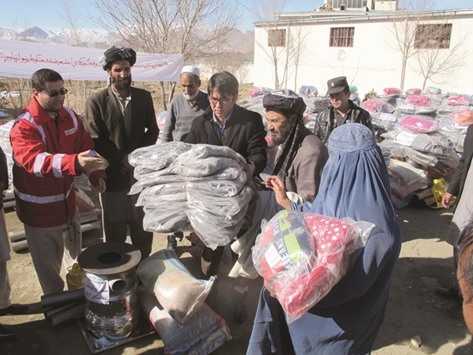The two-month project from November 2015 to January 2016 aimed to alleviate the suffering of the needy and displaced, as well as reducing malnutrition cases.

A woman receiving bankets from a QRCS volunteer.
Some 12,000 Afghans from various districts of four provinces benefited from the project. These included Badakhshan (6,000), Kabul (4,200), Faryab (900), and Wardak (900).
The project involved distributing 8,000 blankets (seven blankets per family), 1,000 wood heaters, 1,000 bags of winter clothes, and 2,000 food packages, each containing 77kg of food such as rice, vegetable oil, sugar, beans, and tea.
Some of the challenges faced by project staff were freezing weather and lack of security in target provinces.
In co-ordination with local partners and authorities, the project was completely done as planned. Its success underscored QRCS’ efforts and the first international humanitarian organisation to reach out to beneficiaries who live in secluded areas.

Children receiving warm clothes from QRCS staff.
QRCS also co-ordinated with the Afghan Red Crescent Society in getting relief items from the local market, quality checks, and local community surveys to select indigent beneficiaries. These included families with no source of income, breadwinners are widows or children, and those with people with disabilities.
Following the distribution, the Badakhshan governor met with the QRCS team to award them a certificate of appreciation in recognition of their efforts. The meeting was attended by a representative of the ministry of foreign affairs.
Thousands of homeless families are suffering severe conditions amid below zero temperatures in northern regions, heavy snowing in cities, and blocked roads in mountains.
This project is part of QRCS’s “Warm Winter” campaign aimed at providing more than QR11mn worth of aid to more than 200,000 beneficiaries in Afghanistan, Yemen, Syria, Lebanon (Syrian and Palestinian refugees), Jordan (Syrian refugees), and Iraqi Kurdistan
(Syrian refugees).

